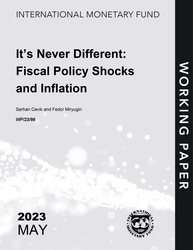
It’s Never Different: Fiscal Policy Shocks and Inflation
It’s Never Different: Fiscal Policy Shocks and Inflation
READ MORE...
Volume/Issue:
Volume 2023
Issue 098
Publication date: May 2023
ISBN: 9798400242878
$20.00
Add to Cart by clicking price of the language and format you'd like to purchase
Available Languages and Formats
| English |
Prices in red indicate formats that are not yet available but are forthcoming.
Topics covered in this book
This title contains information about the following subjects.
Click on a subject if you would like to see other titles with the same subjects.
Inflation , Economics- Macroeconomics , Public Finance , Economics / General , Inflation , fiscal policy , public debt , output gap , local projections , fiscal policy shock , fiscal policy stance , monetary policy type , core CPI , inflation targeting policy , Fiscal stance , Fiscal space , Exchange rate arrangements , Global
Summary
This paper investigates the impact of fiscal shocks on inflation, using a large panel of 139 countries over the period 1970–2021. First, both headline and core measures of inflation increase in response to expansionary shifts in the fiscal policy stance. Second, we split the sample and observe an intriguing pattern that fiscal policy shocks are primarily significant in developing countries. Third, the inflationary impact of fiscal policy shocks is dependent on fiscal space and economic conditions, as well as monetary policy type, exchange rate regimes and fiscal rules, at the time of the shock. We confirm these results by using the narrative approach and forecast errors, as well as cyclically- adjusted data on government revenues and non-interest expenditures, to identify exogenous changes in fiscal policy. The analysis has several important policy implications: (i) fiscal policy is a critical anchor of macroeconomic stability; (ii) fiscal policy should be used with care in aggregate demand management as it has significant effects on inflation, which are highly dependent on fiscal space and economic conditions; and (iii) flexible exchange rates and rule-based policymaking provide greater resilience to inflationary shocks.
Copyright © 2010 - 2026
Powered by:
AIDC



